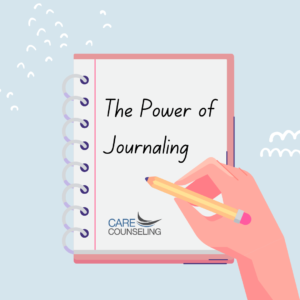The Power of Journaling
 Do you remember keeping a diary as a child, where you penned down your secrets, dreams, and daily experiences? If you haven’t thought about journaling since those days, it might be time to revisit the practice. Journaling isn’t just for your teenage self; it’s a powerful tool for personal growth, self-reflection, and improving mental well-being. In this blog post, we’ll explore the incredible power of journaling and how it can transform your life.
Do you remember keeping a diary as a child, where you penned down your secrets, dreams, and daily experiences? If you haven’t thought about journaling since those days, it might be time to revisit the practice. Journaling isn’t just for your teenage self; it’s a powerful tool for personal growth, self-reflection, and improving mental well-being. In this blog post, we’ll explore the incredible power of journaling and how it can transform your life.
Journaling: More Than Words on Paper
Journaling is more than just writing words on paper; it’s a means of self-expression, self-discovery, and self-improvement. By putting your thoughts, feelings, and experiences down on paper, you engage in a unique form of self-reflection. Here are some of the ways in which journaling can have a profound impact on your life:
- Stress Reduction
In today’s fast-paced world, stress can easily build up. Journaling offers a healthy outlet for releasing pent-up emotions and stress. Writing down your worries and anxieties can help you make sense of them and provide a sense of relief. This process can clear your mind and improve your mental well-being.
- Emotional Processing
Journaling can be a safe space to process your emotions. Whether you’re grappling with grief, anger, or joy, putting your feelings into words can provide clarity and insight. It allows you to examine your emotions from a more objective standpoint, helping you gain a deeper understanding of yourself.
- Goal Setting and Achievement
Setting goals is a vital part of personal growth, and journaling can be a valuable tool for this. By outlining your goals and breaking them down into actionable steps, you’re more likely to achieve them. Regularly journaling about your progress can help you stay on track and adjust as needed.
- Improved Mental Health
Journaling can be a helpful complement to therapy or other mental health practices. It can provide a way to track your thoughts, behaviors, and moods, allowing you to identify patterns and triggers. With this insight, you can make informed choices about your mental health and well-being.
- Enhanced Creativity
Engaging in a daily writing practice can spark creativity and boost problem-solving abilities. Journaling encourages a free flow of ideas and helps you think outside the box. It can be a valuable resource for artists, writers, and professionals in creative fields.
- Increased Self-Understanding
The process of writing in a journal often leads to self-discovery. You may uncover patterns in your thoughts and behaviors, identify your values, and clarify your life’s purpose. This greater self-understanding can guide your decisions and lead to a more fulfilled life.
Types of Journaling
There are various approaches to journaling, so you can find a style that best suits your needs and preferences:
- Morning Pages: Made popular by Julia Cameron in “The Artist’s Way,” morning pages involve writing three pages of stream-of-consciousness thoughts as soon as you wake up. This practice helps clear your mind and prepare you for the day.
- Gratitude Journal: A gratitude journal involves listing things you’re thankful for each day. Focusing on gratitude can boost your mood and overall well-being.
- Bullet Journal: A bullet journal combines to-do lists, calendars, and notes in a customizable format. It’s a great tool for organization and tracking goals.
- Reflective Journaling: This involves writing about your experiences, thoughts, and emotions. It’s a more introspective style that encourages self-reflection.
- Dream Journal: Record your dreams and try to interpret their meanings. This practice can offer insight into your subconscious mind.
Getting Started with Journaling
If you’re new to journaling, it’s easy to get started. All you need is a notebook and a pen. Here are some tips for beginning your journaling journey:
- Set aside time: Find a specific time each day to write in your journal. It could be in the morning, before bed, or during your lunch break.
- Write freely: Don’t worry about grammar, spelling, or structure. Just let your thoughts flow onto the page without self-censorship.
- Choose a focus: Decide on a specific topic or style of journaling that suits your goals and interests.
- Stay consistent: Try to write regularly, even if it’s just a few minutes each day.
- Be patient: The benefits of journaling may not be immediately apparent. Stick with it, and you’ll likely notice positive changes over time.
In conclusion, journaling is a powerful tool for personal growth, self-reflection, and enhanced mental well-being. Whether you’re looking to reduce stress, improve your creativity, or simply gain a better understanding of yourself, journaling can be a transformative practice. So, why not pick up that notebook and pen and start your own journaling journey today? You may be amazed by the positive changes it brings to your life.



























